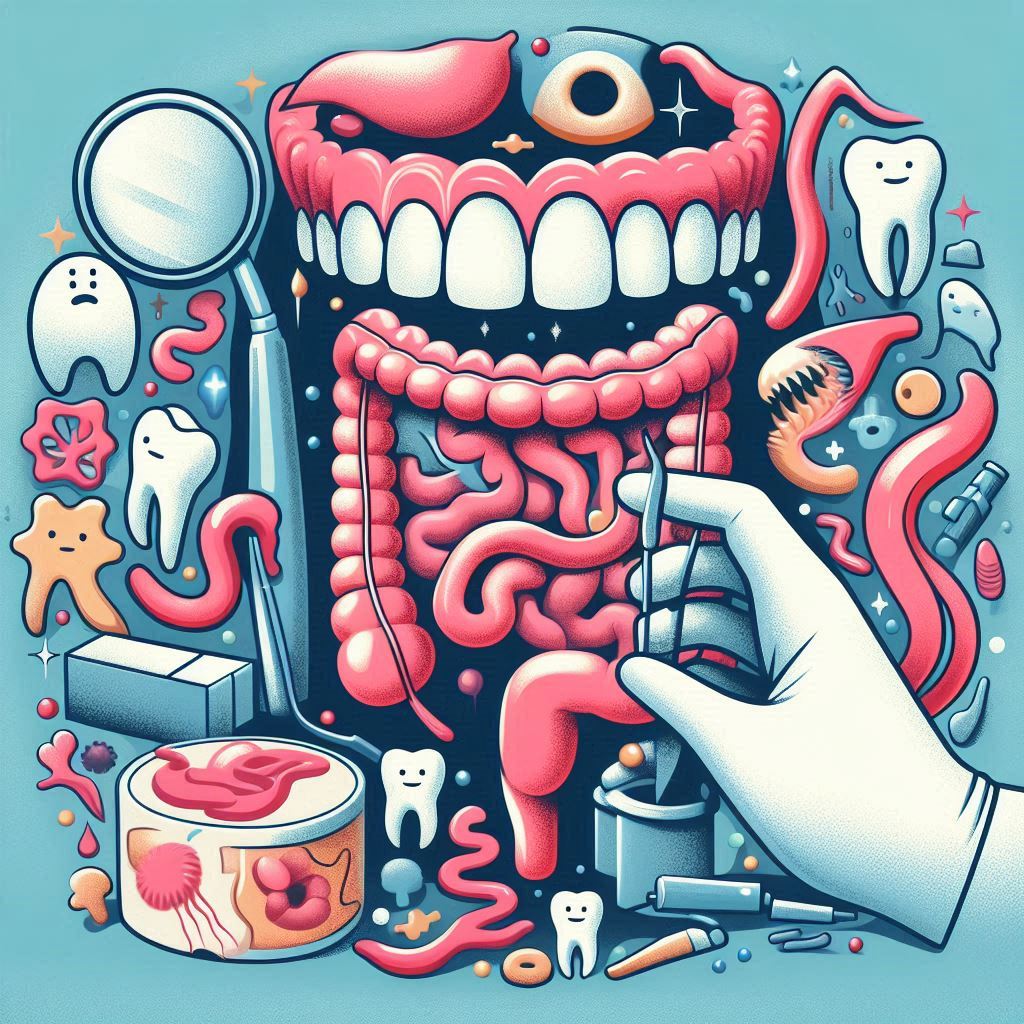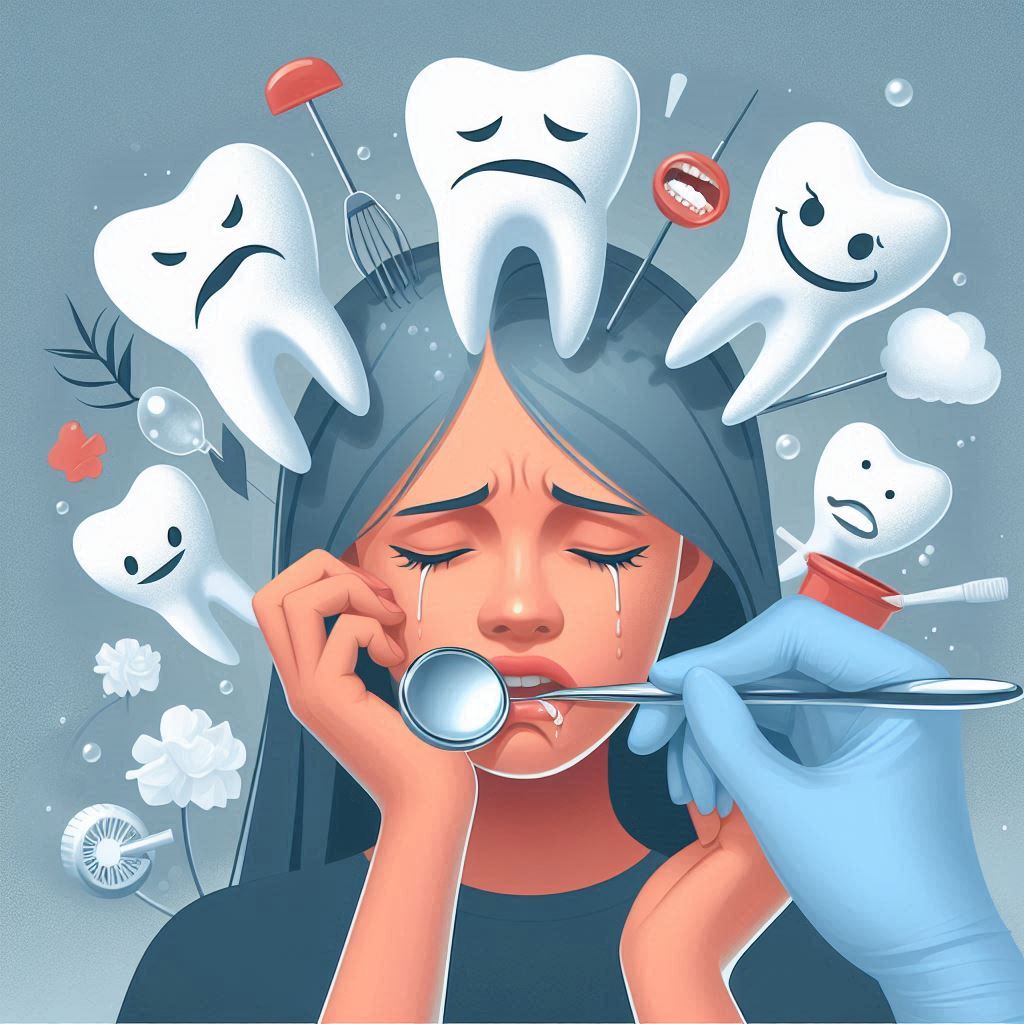Introduction
Crohn’s disease is a chronic, lifelong condition that causes inflammation in the gastrointestinal (GI) tract. It belongs to a group of diseases known as inflammatory bowel diseases (IBD), which also includes ulcerative colitis. The hallmark of Crohn’s disease is its ability to cause inflammation anywhere along the digestive tract, from the mouth to the anus. Most commonly, however, it affects the small intestine and the beginning of the colon. While Crohn’s disease is primarily recognized for its symptoms related to digestion, such as abdominal pain, diarrhea, weight loss, and fatigue, many people fail to recognize the broader impact this disease can have on the body, including the mouth. The connection between Crohn’s disease and oral health is significant, as oral manifestations are not uncommon.
This guide seeks to comprehensively explore the connection between Crohn’s disease and oral health. We will delve into the pathophysiology of Crohn’s disease and how its systemic effects can manifest in the oral cavity. Furthermore, we will discuss the various oral health conditions that are more prevalent in individuals with Crohn’s disease, the potential risk factors, and the best ways to manage and prevent these complications.
Understanding Crohn’s Disease: Pathophysiology and Risk Factors
The Biology of Crohn’s Disease
Crohn’s disease involves an abnormal immune response, where the body’s immune system mistakenly targets and inflames healthy tissues, particularly in the gastrointestinal tract. The inflammation that characterizes Crohn’s disease can extend through multiple layers of the intestines and other areas of the digestive system, causing symptoms such as cramps, diarrhea, and malnutrition.
Crohn’s disease is considered an autoimmune condition, though the precise causes remain unknown. There are likely genetic and environmental factors at play, with certain gene mutations linked to an increased risk of developing the disease. Moreover, environmental triggers such as diet, infections, or smoking may activate these genetic predispositions.
Importantly, Crohn’s disease is chronic and can lead to periods of flare-ups followed by periods of remission. During flare-ups, inflammation intensifies, causing acute symptoms and damage to the gastrointestinal tract. However, the disease can also cause chronic, low-grade inflammation, which may contribute to systemic effects beyond the gut, including in the mouth.
Factors That Increase Risk of Oral Health Problems in Crohn’s Disease
Several factors contribute to the higher risk of oral health problems in individuals with Crohn’s disease:
- Immune System Dysfunction: The primary mechanism of Crohn’s disease is an abnormal immune response, which leads to widespread inflammation. This dysfunction affects not only the gastrointestinal tract but can also influence tissues in other parts of the body, including the mouth.
- Nutritional Deficiencies: Crohn’s disease can lead to malabsorption, where the body is unable to absorb essential nutrients properly. Common deficiencies include vitamins (like vitamin D, A, and B12), iron, and calcium. These nutritional gaps can contribute to weakened oral health, as the body is less able to fight infections or maintain strong teeth and gums.
- Medications and Their Side Effects: The medications used to treat Crohn’s disease, including corticosteroids, immunosuppressants, and biologic drugs, can have side effects that directly affect oral health. For example, corticosteroids can reduce saliva production, while immunosuppressants may increase the risk of infections, including those in the mouth.
- Chronic Inflammation: The chronic inflammation that characterizes Crohn’s disease can also affect the mucous membranes in the mouth, leading to discomfort and an increased risk of developing oral sores or infections.
Oral Manifestations of Crohn’s Disease
Oral health issues are not only common among individuals with Crohn’s disease, but they can sometimes serve as the first signs of the condition. The following sections discuss the most common oral manifestations of Crohn’s disease in detail.
Mouth Sores and Ulcers (Aphthous Stomatitis)
Mouth sores are among the most frequent oral symptoms experienced by those with Crohn’s disease. These painful lesions, often referred to as canker sores or aphthous ulcers, can appear on the gums, tongue, inner cheeks, or lips. They can vary in size, from small, shallow ulcers to larger, deeper lesions that can be particularly painful.
Mouth ulcers occur as a result of the inflammation that affects the mucosal lining of the mouth. This is often a direct extension of the inflammation in the gastrointestinal tract, as the mouth is the first part of the digestive system and shares similar tissue structures. In severe cases, the ulcers can become infected, further complicating treatment and healing.
Dry Mouth (Xerostomia)
Dry mouth, or xerostomia, is a common problem for individuals with Crohn’s disease. This condition occurs when there is an insufficient production of saliva, which serves many important functions, including helping to prevent tooth decay, neutralizing acids, and promoting the healing of minor oral injuries. Saliva also plays a crucial role in digestion by beginning the breakdown of food in the mouth.
Several factors contribute to dry mouth in Crohn’s patients. First, the medications used to treat the disease, particularly corticosteroids and other immunosuppressants, can reduce saliva production. Secondly, dehydration, which is a common issue for Crohn’s disease patients due to diarrhea and malabsorption, can also reduce the body’s ability to produce saliva. Without enough saliva, the mouth becomes more vulnerable to cavities, gum disease, and oral infections.
Gum Disease (Periodontal Disease)
Gum disease, or periodontal disease, is another significant oral health concern for individuals with Crohn’s disease. The chronic inflammation associated with Crohn’s disease makes the gums more susceptible to infection and disease. Individuals with Crohn’s disease are at higher risk for developing gingivitis (inflammation of the gums) and periodontitis (an advanced form of gum disease that can lead to tooth loss).
Inflammation of the gums can cause symptoms such as redness, swelling, and bleeding, particularly when brushing or flossing. If left untreated, gum disease can lead to more severe complications, including the loosening of teeth and damage to the bone supporting the teeth.
Delayed Growth and Development of Teeth in Children
For children and adolescents with Crohn’s disease, there are additional concerns regarding oral health. Chronic inflammation, malnutrition, and the side effects of medications can all contribute to delayed growth and development, including the development of teeth. Children with Crohn’s disease may experience delayed eruption of teeth, misalignment, or other dental developmental issues.
Additionally, nutritional deficiencies such as a lack of vitamin D, calcium, and other essential nutrients can interfere with proper bone and tooth formation, leading to weakened enamel and an increased risk of cavities and other dental problems.
Oral Infections
The weakened immune system associated with Crohn’s disease can lead to an increased susceptibility to oral infections. One common infection seen in Crohn’s patients is oral candidiasis, or thrush. This fungal infection is characterized by the presence of white, creamy lesions in the mouth, often on the tongue or inside of the cheeks. Infections like these can be uncomfortable and can complicate existing oral health problems, requiring prompt treatment.
Additionally, the use of immunosuppressive medications, such as corticosteroids or biologics, further suppresses the immune response, making it more difficult for the body to fend off infections in the mouth and other areas.
Increased Risk of Oral Cancer
While Crohn’s disease itself does not directly cause oral cancer, research suggests that individuals with Crohn’s disease may have a higher risk of developing cancers of the oral cavity and oropharynx. This increased risk is believed to be linked to chronic inflammation, which can lead to mutations in the cells of the mouth and throat. Moreover, certain medications used to treat Crohn’s disease, particularly immunosuppressants, may further increase the risk of cancer by lowering the body’s ability to fight abnormal cells.
Managing Oral Health in Crohn’s Disease: Strategies for Prevention and Care
The good news is that with the right care, individuals with Crohn’s disease can minimize the impact of oral health issues and maintain a healthy mouth. Here are some strategies for managing oral health effectively.
Regular Dental Visits
Routine dental visits are of paramount importance for individuals living with Crohn’s disease. The connection between Crohn’s disease and oral health is well-established, with many patients experiencing specific oral manifestations due to the systemic inflammation associated with the condition. By visiting the dentist regularly, individuals with Crohn’s disease can benefit from early detection and intervention for issues like mouth sores, gum disease, and dry mouth. A dentist can spot these signs early and address them before they develop into more severe problems.
In addition to detecting potential issues, dental professionals provide preventive care during routine check-ups. Professional cleanings help eliminate plaque and tartar buildup that regular brushing may miss, reducing the risk of cavities and gum disease. Fluoride treatments offered during dental visits can strengthen tooth enamel, making it more resistant to decay, particularly in patients who are prone to dry mouth or who are using medications that may increase the risk of cavities. Dentists can also offer tailored advice on managing specific oral health challenges related to Crohn’s disease, such as recommendations for toothpaste and mouthwashes that help soothe irritation or prevent further damage.
It’s important to note that Crohn’s disease is a lifelong condition, and oral health issues can fluctuate in intensity, especially during flare-ups. Therefore, maintaining an ongoing relationship with a dentist who is familiar with Crohn’s disease is essential to staying on top of oral health and addressing any emerging concerns promptly.
Excellent Oral Hygiene Practices
For individuals with Crohn’s disease, maintaining excellent oral hygiene is crucial to preventing common oral complications such as gum disease, cavities, and oral infections. Because Crohn’s disease is associated with a heightened inflammatory response and an increased vulnerability to infections, it’s even more important for individuals with this condition to practice good oral hygiene consistently. Basic oral care practices such as brushing teeth at least twice a day with fluoride toothpaste, flossing daily, and using an antiseptic mouthwash are essential for reducing bacteria and plaque accumulation. Fluoride toothpaste is particularly beneficial for people with dry mouth, as it helps protect tooth enamel from the acids in the mouth and strengthens teeth over time. Daily flossing removes food particles and plaque from between teeth, where toothbrushes may not reach, helping to prevent gum disease and cavities.
To further protect oral health, individuals with Crohn’s disease should replace their toothbrush regularly, especially if the bristles are worn. It’s also wise to use a soft-bristled toothbrush to avoid irritating sensitive gums or worsening mouth sores. Brushing gently but thoroughly ensures that the teeth and gums are cleaned without causing further irritation. Some individuals may find that using an electric toothbrush makes brushing easier and more effective, as it can help remove more plaque and reduce the effort required. Additionally, using mouthwash or an antimicrobial rinse designed for people with sensitive mouths can help reduce bacteria, neutralize acids, and provide relief for conditions such as dry mouth or mouth sores. Mouthwashes containing fluoride or xylitol are particularly helpful in maintaining oral health for people with Crohn’s disease.
Hydration and Moisturizing the Mouth
Dry mouth, or xerostomia, is a common concern for individuals with Crohn’s disease, often exacerbated by medications used to treat the condition. Dry mouth can increase the risk of tooth decay, gum disease, and oral infections, as there is less saliva to wash away food particles and neutralize acids. Therefore, staying hydrated is one of the most important strategies for alleviating dry mouth and improving overall oral comfort. Drinking water throughout the day helps keep the mouth moist, reduces discomfort, and supports overall hydration. If an individual struggles with dry mouth, they should aim to drink water frequently, especially after meals or snacks, to aid in digestion and clear the mouth of any food debris. Using a humidifier at night can also help reduce the dryness in the mouth during sleep.
In addition to drinking water, individuals with dry mouth may benefit from using saliva substitutes or oral moisturizers. These products are available over-the-counter in sprays, gels, or rinses and can provide temporary relief for dry mouth symptoms, particularly during the night when natural saliva production slows down. People with Crohn’s disease should also consider avoiding products that contain alcohol or strong flavoring agents, as these can irritate the mouth further. For patients who continue to experience dry mouth despite these measures, it may be helpful to consult a dentist or doctor about alternative treatments or therapies that can stimulate saliva production.
Managing Mouth Sores and Ulcers
Mouth sores, or aphthous ulcers, are a common oral manifestation of Crohn’s disease. These painful ulcers can make speaking, eating, and swallowing difficult, impacting overall quality of life. Managing mouth sores effectively is crucial to minimizing discomfort and preventing further oral complications. Over-the-counter treatments, such as topical gels or mouth rinses, can provide relief from pain and inflammation associated with mouth sores. Products containing ingredients like benzocaine or hydrocortisone may help soothe the area, reduce swelling, and promote healing. Additionally, mouthwashes with salt or baking soda solutions may provide temporary relief by reducing acidity and preventing infection in the affected area.
In some cases, if mouth sores persist or become particularly severe, a healthcare provider may prescribe corticosteroids or other anti-inflammatory medications to reduce inflammation and speed up the healing process. It’s essential to follow the prescribed treatment regimen carefully and avoid irritating foods, such as acidic or spicy items, that can aggravate mouth sores. Managing the underlying inflammation associated with Crohn’s disease can also help prevent recurrent ulcers.
Nutritional Support and Diet Modifications
A well-balanced diet plays an essential role in maintaining oral health, especially for individuals with Crohn’s disease. Malnutrition is common in Crohn’s patients due to gastrointestinal malabsorption, which can lead to deficiencies in vitamins and minerals that are crucial for healthy teeth and gums. Proper nutrition is vital not only for controlling symptoms of Crohn’s disease but also for sustaining oral health. Individuals with Crohn’s disease should focus on a diet rich in vitamins and minerals, particularly calcium, vitamin D, and B vitamins. Calcium and vitamin D are essential for maintaining strong teeth and bones, while B vitamins help support the health of the gums and oral tissues. Foods rich in antioxidants, such as fruits and vegetables, can also help reduce inflammation and promote healing. A nutritionist or dietitian specializing in Crohn’s disease can provide valuable guidance on planning meals that are both gut-friendly and supportive of oral health.
In addition to ensuring adequate nutrition, individuals with Crohn’s disease should avoid foods that can irritate the mouth or worsen gastrointestinal symptoms. Spicy, acidic, and rough-textured foods may exacerbate mouth sores or irritate the digestive tract. Soft, easy-to-digest foods that are high in nutritional value, such as smoothies or soups, can be more comfortable to consume and help prevent malnutrition.
Collaboration with Healthcare Providers
A comprehensive and integrated approach to managing Crohn’s disease and oral health is essential. As both the gastrointestinal and oral health systems can be affected by the disease, it’s important that healthcare providers, including gastroenterologists, dentists, and nutritionists, collaborate to offer coordinated care.
Regular communication between these professionals ensures that all aspects of the patient’s health are addressed and that any emerging complications are caught early. For example, a gastroenterologist may provide medication or dietary recommendations to manage Crohn’s disease symptoms, while a dentist can address any oral manifestations or oral health complications. A nutritionist can help design a diet plan that supports both gastrointestinal and oral health, ensuring that the patient is receiving all the essential nutrients. By working together, healthcare providers can optimize treatment strategies, reduce the risk of complications, and improve the overall quality of life for individuals with Crohn’s disease. This multidisciplinary approach not only addresses the physical symptoms of the disease but also helps individuals manage the emotional and psychological challenges that come with living with a chronic condition.
Conclusion
Crohn’s disease is a chronic inflammatory condition primarily affecting the digestive system but also influencing various parts of the body, including the mouth. People with Crohn’s disease often experience oral health issues such as mouth sores, dry mouth, gum disease, and an increased susceptibility to infections. These oral manifestations are linked to the systemic inflammation characteristic of Crohn’s disease, which can extend beyond the gastrointestinal tract.
Mouth sores, or aphthous ulcers, are common in Crohn’s patients and can make eating and speaking painful. Additionally, dry mouth (xerostomia) results from reduced saliva production, which is compounded by dehydration and medications used to treat the disease. This lack of saliva can increase the risk of tooth decay and gum disease, as saliva is vital for maintaining oral hygiene and preventing infections. Gum disease, including gingivitis and periodontitis, is also more prevalent in individuals with Crohn’s due to the chronic inflammation affecting the gums.
To protect oral health, individuals with Crohn’s disease should prioritize regular dental check-ups to monitor for early signs of complications. Maintaining good oral hygiene, including brushing twice a day, flossing, and using an antiseptic mouthwash, can help prevent plaque buildup and reduce the risk of gum disease. Hydration is essential for managing dry mouth, and consuming a balanced diet rich in vitamins and minerals is crucial to support both oral and overall health.
By understanding the connection between Crohn’s disease and oral health, patients can take proactive steps to minimize complications. With appropriate care, including professional dental visits, proper hydration, and nutrition, it is possible to maintain a healthy mouth and body, despite the challenges presented by Crohn’s disease.
SOURCES
Adams, S. D., 2020. Crohn’s disease and oral health: A review of the literature. Journal of Gastrointestinal Disorders, 34(2), 156-163.
Alonso, S. A., 2018. Oral manifestations of Crohn’s disease: An update on diagnosis and treatment. Journal of Clinical Dentistry, 29(3), 215-222.
Cohen, A. D., 2019. The impact of inflammatory bowel diseases on oral health. World Journal of Gastroenterology, 25(12), 1409-1418.
Fitzpatrick, R. A., 2017. Understanding the oral health implications of Crohn’s disease. Oral Diseases, 23(5), 643-650.
Griffiths, A. M., 2021. Nutritional management in Crohn’s disease and its effect on oral health. Gastroenterology Clinics, 38(4), 1185-1196.
Lee, C. M., 2020. Crohn’s disease and periodontitis: The role of chronic inflammation. Journal of Periodontal Research, 55(4), 431-439.
Miller, R. S., 2018. The connection between Crohn’s disease and oral health complications: A multidisciplinary approach. Clinical Gastroenterology and Hepatology, 16(10), 1499-1504.
Nelson, M. M., 2020. The role of diet in Crohn’s disease and oral health: An integrative approach. Journal of Clinical Nutrition, 42(7), 624-633.
Peters, A. K., 2019. Oral ulcers in Crohn’s disease: Pathophysiology and clinical management. Gastroenterology Nursing, 42(1), 36-41.
Ramirez, S. E., 2022. Dry mouth and its relationship to Crohn’s disease and pharmacological treatments. Journal of Oral & Maxillofacial Surgery, 79(8), 1411-1416.
Rios, M. G., 2021. Understanding the relationship between immune dysfunction in Crohn’s disease and oral health problems. Journal of Immunology and Oral Health, 24(6), 546-555.
Smith, J. P., 2018. Crohn’s disease and its relationship to increased risk of oral infections. Journal of Infectious Diseases and Oral Health, 19(2), 102-110.
Taylor, C. H., 2020. Managing oral health complications in Crohn’s disease: Preventive strategies and therapeutic considerations. Journal of Gastrointestinal Medicine, 28(9), 1073-1081.
Turner, D. R., 2017. Effects of Crohn’s disease on the development of dental health in children. Pediatric Gastroenterology, Hepatology & Nutrition, 13(3), 199-205.
Vickers, L. T., 2019. Oral manifestations of Crohn’s disease: Clinical implications and diagnostic strategies. International Journal of Dentistry, 35(11), 2568-2575.
Wright, S. E., 2020. Investigating the impact of Crohn’s disease medications on oral health: A review of current literature. Journal of Clinical Pharmacology, 60(5), 521-529.
HISTORY
Current Version
January 22, 2025
Written By:
SUMMIYAH MAHMOOD




